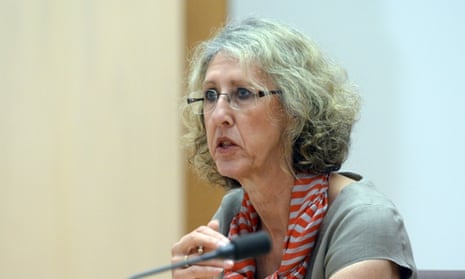The president of the Australian Senate says he is “disappointed” at “some of the content” in an extraordinary email sent by the clerk of the Senate to Britain’s House of Commons, warning against appointing another Australian parliamentary bureaucrat as clerk of the Commons.
The president, Tasmanian senator Stephen Parry, said he had spoken to the email’s author, Senate clerk Rosemary Laing, as well as the Speaker of the House of Commons, John Bercow, about the international spat between political bureaucrats.
In her email to the outgoing clerk of the House of Commons, Sir Robert Rogers, Laing warned that appointing Carol Mills, the secretary of the Department of Parliamentary Services in Canberra, as his successor would be an “affront” to the profession of parliamentary clerks who are responsible for overseeing the drafting of legislation and protecting the privileges of parliamentarians.
“We were utterly taken aback here when we saw a brief press report in early July that Carol Mills had emerged as ‘frontrunner’ to take over from you, and have followed events with increasing disbelief and dismay,” Laing wrote.
“It seemed to us impossible that someone without parliamentary knowledge and experience could be under consideration for such a role.”
But Parry, who together with the Speaker of the House of Representatives, Bronwyn Bishop, is responsible for the Department of Parliamentary Services, said it was “a great honour that a senior officer from Australia has been chosen as the preferred candidate for the position of clerk of the House of Commons”.
And he was clearly unhappy with Laing’s intervention, saying he was “disappointed the email has been made public and disappointed at some of its content”.
Asked whether he intended to take any further action against Laing or as a result of the incident, he said it was “too early to comment on what may or may not happen”.
Mills’s name has been passed to Downing Street which normally passes recommended names for such appointments to the Queen for her approval.
Rogers, who will take early retirement at the end of the month after clashing with the Speaker, has asked for a delay in the appointment, which is formally made by the Queen.
Bercow, who has won widespread praise for the way he is modernising parliament by summoning ministers on a more regular basis, is keen to reform the clerk’s office. He ensured the appointment was advertised for the first time since the post of clerk was created in 1363.
But a group of senior MPs at Westminster have written to the British prime minister, David Cameron, to express concerns at the proposed appointment of Mills amid fears she has little understanding of the constitutional side of parliamentary business.
In the email, Laing referred to a highly controversial incident in which the Department of Parliamentary Services confirmed it had used CCTV cameras, which are supposed to be used only for security and to prosecute illegal activity, to retrace the movements of a DPS employee and recorded her pushing an envelope under the door of a senator’s office during a late night visit to parliament house.
The incident angered the senator involved, veteran former Labor minister John Faulkner, who said it was “a massive, massive breach of proper process” and amounted to being “spied on”.
Mills conceded in May that “there may have been some inadvertent conflict between staff management issues and the principles of the free use of everything in the building for members and senators”.
Laing advised Faulkner that “the use of electronic surveillance of a senator’s office for unauthorised purposes to intimidate persons who provide information to senators is also capable of being a contempt”.
The incident has been referred to the Senate privileges committee for inquiry, but in her email, Laing said: “I was surprised that a resignation did not follow.”
Laing is understood to have sent the email as private advice to Rogers. Neither she nor Mills would comment on the record.
The clerk of the Senate is appointed by the president of the Senate “after consultation with senators” for a 10-year, non-renewable, term. The clerk can only be removed by a motion of the Senate.
